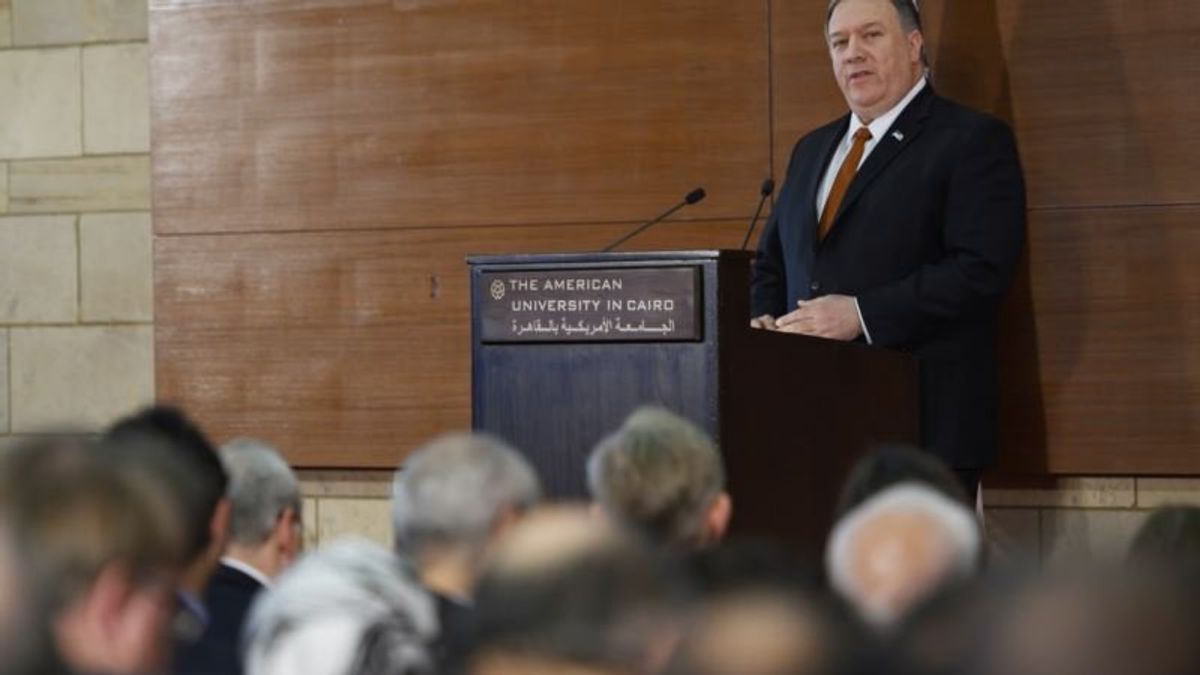
Pompeo Calls for New Spirit of Cooperation Between US, Arab Allies
Pompeo Calls for New Spirit of Cooperation Between US, Arab Allies

CAIRO —
U.S. Secretary of State Mike Pompeo met with Egyptian leaders Thursday on the third stop of his nine-nation tour of the Middle East. The top U.S. diplomat said his country was pulling out of Syria, but remained steadfast in its determination to fight terrorism. In a speech at the American University in Cairo, he maintained that the U.S. was a "force of good in the region," and "never set out to occupy anyone," unlike Iran. He urged America's Arab allies, however, to shoulder more responsibility in the fight against terrorism.
SEE ALSO:
Obama Speech Gets Mostly Positive React; With Some Skepticism
Pompeo's visit comes nearly 10 years after former U.S. President Barack Obama's much-heralded foreign policy address to students at Cairo University which some say set the stage for the Arab Spring popular uprisings that ended mostly in disillusion and bloodshed.
During his speech at the American University of Cairo, Pompeo criticized Obama for standing by and taking little or no action as revolutions convulsed the Arab world and the Iranian government repressed popular protests.
"What did we learn from all of this? We learned that when America retreats, chaos often follows. When we neglect our friends, resentment builds. And when we partner with our enemies, they advance. The good news, the good news is this: the age of self-inflicted American shame is over, and so are the policies that produced so much needless suffering."
SEE ALSO:
Pompeo Pledges Continued Islamic State Fight After US Troop Withdrawal
Fighting extremist ideologies
Earlier, Pompeo told a press conference that the Trump administration was adopting a more consensual approach with its allies and sought their cooperation in the battle against extremist ideologies.
"The U.S. under President Trump will remain a steadfast partner in the region for Egypt and others. We urge every country to take meaningful action to crush terrorism and denounce its ideological roots… Our robust battle against ISIS, al-Qaida and other regional groups will continue. Egypt and the United States are also working together to solidify the Middle East Strategic Alliance, as a means for advancing regional peace, security and prosperity."
Foreign Minister Sameh Shoukry insisted that Egypt was doing its best to combat terrorist groups and their ideologies, alongside the U.S.
"Despite the fact that the capabilities of ISIS or Daesh have been degraded to a very large extent, the network of terrorist organizations goes far beyond that… operating under various names in Syria, in Iraq, in Libya and in West Africa: Boko Haram, Ahrar al-Sham, al-Nusra, the Muslim Brotherhood. They are all associated with the same ideology of fundamentalism, extremism, exclusion and they resort to violence and terrorism… this is a threat that we all face and one that we are determined to fully eradicate," said Shoukry.
Proposed strategic alliance
Secretary Pompeo urged U.S. allies in the region to take part in the Trump administration's new strategic initiative, called the Middle East Strategic Alliance, or MESA. U.S. National Security Advisor John Bolton has reportedly set up a meeting of U.S. allies during Secretary Pompeo's upcoming stop in Oman, to discuss MESA.

Neither Egyptian President Abdel Fattah el-Sissi nor Foreign Minister Sameh Shoukry hinted at Egypt's intentions over the proposed alliance.
Hilal Khashan, who teaches political science at the American University of Beirut, tells VOA that he is pessimistic about the chances of the new alliance succeeding. He said the Middle East is "neither Europe nor Japan," where the U.S. began as an occupying power after World War II, helped rebuild those regions, then withdrew, leaving a system of alliances, like NATO, in place.
"Even if [MESA] does in fact come into existence," he argues, "it will remain ineffective." Iran, he says,"has a clear and steady regional policy [while its opponents] do not… No country in the region," he says, "is wiling to go to war against Iran or make a serious effort to stop it."
 Protectionism, Dysfunction Could Hurt US Businesses, Warns Chamber of CommerceNext PostFBI Agents Urge Congress, White House to Fund Bureau ‘Immediately’
Protectionism, Dysfunction Could Hurt US Businesses, Warns Chamber of CommerceNext PostFBI Agents Urge Congress, White House to Fund Bureau ‘Immediately’





